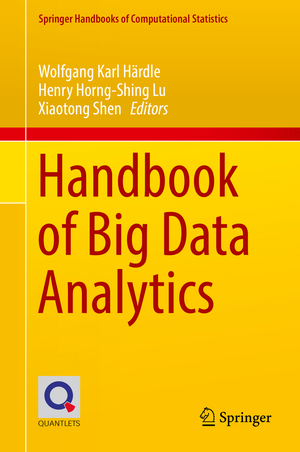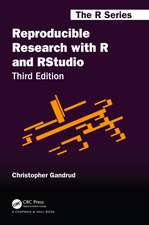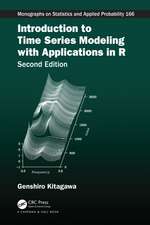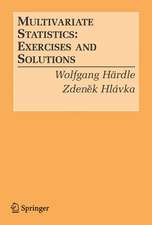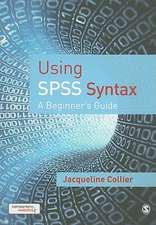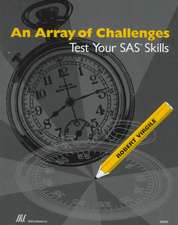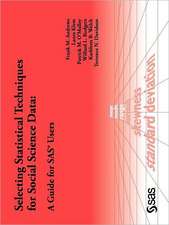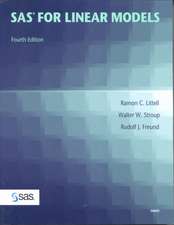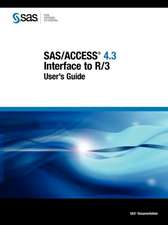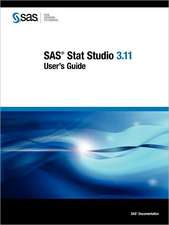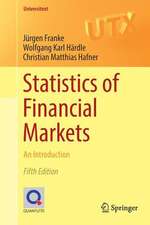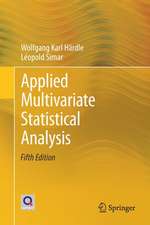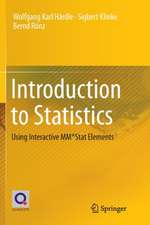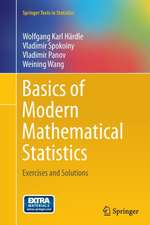Handbook of Big Data Analytics: Springer Handbooks of Computational Statistics
Editat de Wolfgang Karl Härdle, Henry Horng-Shing Lu, Xiaotong Shenen Limba Engleză Hardback – aug 2018
| Toate formatele și edițiile | Preț | Express |
|---|---|---|
| Paperback (1) | 2064.38 lei 6-8 săpt. | |
| Springer International Publishing – 10 dec 2019 | 2064.38 lei 6-8 săpt. | |
| Hardback (1) | 2070.60 lei 6-8 săpt. | |
| Springer International Publishing – aug 2018 | 2070.60 lei 6-8 săpt. |
Preț: 2070.60 lei
Preț vechi: 2525.12 lei
-18% Nou
Puncte Express: 3106
Preț estimativ în valută:
396.45€ • 412.83$ • 328.94£
396.45€ • 412.83$ • 328.94£
Carte tipărită la comandă
Livrare economică 14-28 februarie
Preluare comenzi: 021 569.72.76
Specificații
ISBN-13: 9783319182834
ISBN-10: 3319182838
Pagini: 600
Ilustrații: VIII, 538 p. 147 illus., 109 illus. in color.
Dimensiuni: 155 x 235 x 36 mm
Greutate: 0.94 kg
Ediția:1st ed. 2018
Editura: Springer International Publishing
Colecția Springer
Seria Springer Handbooks of Computational Statistics
Locul publicării:Cham, Switzerland
ISBN-10: 3319182838
Pagini: 600
Ilustrații: VIII, 538 p. 147 illus., 109 illus. in color.
Dimensiuni: 155 x 235 x 36 mm
Greutate: 0.94 kg
Ediția:1st ed. 2018
Editura: Springer International Publishing
Colecția Springer
Seria Springer Handbooks of Computational Statistics
Locul publicării:Cham, Switzerland
Public țintă
ResearchCuprins
Preface.- Statistics, Statisticians, and the Internet of Things (John M. Jordan and Dennis K. J. Lin).- Cognitive Data Analysis for Big Data (Jing Shyr, Jane Chu and Mike Woods).- Statistical Leveraging Methods in Big Data (Xinlian Zhang, Rui Xie and Ping Ma).- Scattered Data and Aggregated Inference (Xiaoming Huo, Cheng Huang and Xuelei Sherry Ni).- Nonparametric Methods for Big Data Analytics (Hao Helen Zhang).- Finding Patterns in Time Series (James E. Gentle and Seunghye J. Wilson).- Variational Bayes for Hierarchical Mixture Models (Muting Wan, James G. Booth and Martin T. Wells).- Hypothesis Testing for High-Dimensional Data (Wei Biao Wu, Zhipeng Lou and Yuefeng Han).- High-Dimensional Classification (Hui Zou).- Analysis of High-Dimensional Regression Models Using Orthogonal Greedy Algorithms (Hsiang-Ling Hsu, Ching-Kang Ing and Tze Leung Lai).- Semi-Supervised Smoothing for Large Data Problems (Mark Vere Culp, Kenneth Joseph Ryanand George Michailidis).- Inverse Modeling: A Strategy to Cope with Non-Linearity (Qian Lin, Yang Li and Jun S. Liu).- Sufficient Dimension Reduction for Tensor Data (Yiwen Liu, Xin Xing and Wenxuan Zhong).- Compressive Sensing and Sparse Coding (Kevin Chen and H. T. Kung).- Bridging Density Functional Theory and Big Data Analytics with Applications (Chien-Chang Chen, Hung-Hui Juan, Meng-Yuan Tsai and Henry Horng-Shing Lu).- Q3-D3-LSA: D3.js and generalized vector space models for Statistical Computing (Lukas Borke and Wolfgang Karl Härdle).- A Tutorial on Libra: R Package for the Linearized Bregman Algorithm in High-Dimensional Statistics (Jiechao Xiong, Feng Ruan and Yuan Yao).- Functional Data Analysis for Big Data: A Case Study on California Temperature Trends (Pantelis Zenon Hadjipantelis and Hans-Georg Müller).- Bayesian Spatiotemporal Modeling for Detecting Neuronal Activation via Functional Magnetic Resonance Imaging (Martin Bezener, Lynn E.Eberly, John Hughes, Galin Jones and Donald R. Musgrove).- Construction of Tight Frames on Graphs and Application to Denoising (Franziska Göbel, Gilles Blanchard and Ulrike von Luxburg).- Beta-Boosted Ensemble for Big Credit Scoring Data (Maciej Zięba and Wolfgang Karl Härdle).-
Notă biografică
Wolfgang Karl Härdle is Ladislaus von Bortkievicz Professor of Statistics at the Humboldt University of Berlin and director of C.A.S.E. (Center for Applied Statistics and Economics), director of the Collaborative Research Center 649 "Economic Risk" and also of the IRTG 1792 "High Dimensional Nonstationary Time Series". He teaches quantitative finance and semiparametric statistics. Professor Härdle's research focuses on dynamic factor models, multivariate statistics in finance and computational statistics. He is an elected member of the International Statistical Institute (ISI) and advisor to the Guanghua School of Management, Peking University, China.
Henry Horng-Shing Lu is Professor at the Institute of Statistics of the National Chiao Tung University, Taiwan and serves as the Vice President of Academic Affairs. He received his Ph.D. in Statistics from Cornell University, NY in 1994. He is an elected member of the International Statistical Institute (ISI). His research interests include statistics, applications and big data analytics. Professor Lu analyzes different types of data by developing statistical methodologies for machine learning with the power of statistical inference and computation algorithms. His findings were published in a wide spectrum of journals and conference papers. He also co-edited the Handbook of Statistical Bioinformatics, published by Springer in 2011.
Xiaotong Shen is John Black Johnston Distinguished Professor at the School of Statistics of the University of Minnesota, MN. He received his Ph.D. in Statistics from the University of Chicago, IL in 1991. He is Fellow of the American Statistical Association (ASA), the Institute of Mathematical Statistics (IMS), and the American Association for the Advancement of Science (AAAS) as well as an elected member of the International Statistical Institute (ISI). Professor Shen’s areas of interest include machine learning anddata mining, likelihood-based inference, semiparametric and nonparametric models, model selection and averaging. His current research efforts are mainly devoted to the further development of structured learning as well as high-dimensional/high-order analysis. The targeted application areas are biomedical sciences and engineering.
Henry Horng-Shing Lu is Professor at the Institute of Statistics of the National Chiao Tung University, Taiwan and serves as the Vice President of Academic Affairs. He received his Ph.D. in Statistics from Cornell University, NY in 1994. He is an elected member of the International Statistical Institute (ISI). His research interests include statistics, applications and big data analytics. Professor Lu analyzes different types of data by developing statistical methodologies for machine learning with the power of statistical inference and computation algorithms. His findings were published in a wide spectrum of journals and conference papers. He also co-edited the Handbook of Statistical Bioinformatics, published by Springer in 2011.
Xiaotong Shen is John Black Johnston Distinguished Professor at the School of Statistics of the University of Minnesota, MN. He received his Ph.D. in Statistics from the University of Chicago, IL in 1991. He is Fellow of the American Statistical Association (ASA), the Institute of Mathematical Statistics (IMS), and the American Association for the Advancement of Science (AAAS) as well as an elected member of the International Statistical Institute (ISI). Professor Shen’s areas of interest include machine learning anddata mining, likelihood-based inference, semiparametric and nonparametric models, model selection and averaging. His current research efforts are mainly devoted to the further development of structured learning as well as high-dimensional/high-order analysis. The targeted application areas are biomedical sciences and engineering.
Textul de pe ultima copertă
Addressing a broad range of big data analytics in cross-disciplinary applications, this essential handbook focuses on the statistical prospects offered by recent developments in this field. To do so, it covers statistical methods for high-dimensional problems, algorithmic designs, computation tools, analysis flows and the software-hardware co-designs that are needed to support insightful discoveries from big data. The book is primarily intended for statisticians, computer experts, engineers and application developers interested in using big data analytics with statistics. Readers should have a solid background in statistics and computer science.
Caracteristici
Offers a valuable guide to a broad range of big data analytics with statistics in cross-disciplinary applications Shows how to handle high-dimensional problems in big data analytics Offers software-hardware co-designs for big data analytics
